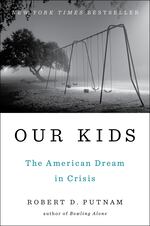
Robert Putnam made his name with the book "Bowling Alone," which argued that community institutions in America were collapsing, leaving our social lives — and our democracy — in a state of decay. Putnam's new book "Our Kids: The American Dream in Crisis" details the growing gap in social mobility in this country.
"We are less likely to know people of a different social class," Putnam says. "We are less likely to marry people of a different social class background. We are more likely to go to school with people like us and not go to school with people from a different social background."
Putnam joined host Dave Miller to discuss some of the key points in his new book. Using personal interviews with young people in various economic situations around the country along with social science research, Putnam argues that the American Dream is in crisis.
"American Dream can mean many things," Putnam says. But I think the core idea that's animated America since our very beginning is that how well you do in life should depend upon your own God-given talents and your grit and determination. But it shouldn't depend upon things your parents did or didn't do."
Putnam says the concept of this ideology is the founding fathers' idea that "all men are created equal."
He begins by talking about his hometown of Port Clinton, Ohio. He uses it as a representation of what he believes American town should be like.
"It was not a rich place. There were no very rich kids in town. No very poor kids in town," Putnam says.
Growing up in the 1950s, Putnam realized his generation did something different from younger generations.
"The answer is: all of us, almost all of us, did better than our parents," Putnam says. "It was really the American Dream."
Putnam's book features profiles of two young people in Bend, Oregon: Andrew and Kayla. They grew up on two different sides of the river. Andrew is the son of a business person, while Kayla's parents struggle to maintain good jobs. Both are having different social experiences while growing up.
"The Bend story that I'm talking about here is completely typical of what's happened in America in the last 30 years," Putnam says. "Bend as a site captures visibly this growing segregation of our communities between folks who are affluent and folks who are not."
Putnam says he sees much less concern for youth population in any particular community, with parents much more focused on their own children's well being. He says this contributes to disparities in the education system.
"The [class] segregation has immediate consequences for the educational process," Putnam says. "We are becoming two separate Americas, and that undermines the opportunities that are available for all our kids."
Putnam says one of the most important social developments was the creation of the public high school in the early part of the last century.
"God did not invent the public high school," Putnam says. "The public high school was invented by social reformers in America around 1910 on the theory that every kid in America ought to get a free secondary education."
Putnam says other factors, like race, deserve attention and are related to economic class. On some disparity issues, the country has made progress. For instance, he says, the racial gap in test scores is now half the size of the class gap.
